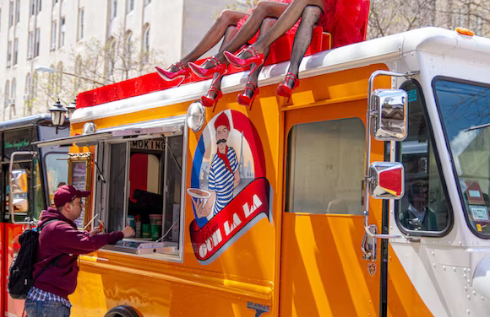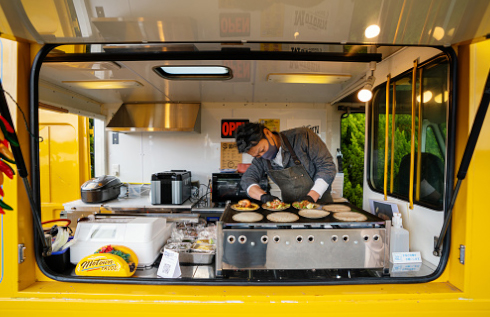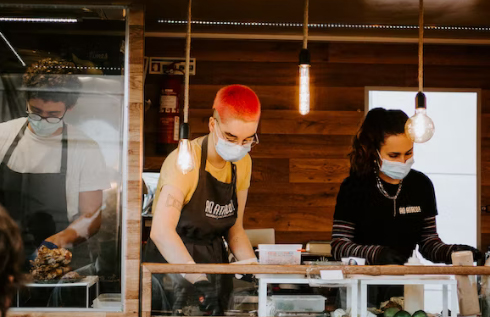Food aficionados with an entrepreneurial itch might not be able to afford to open a brick-and-mortar restaurant, but they could be able to open a food truck business. A food truck is a large vehicle equipped with a kitchen where food may be prepared and served. Food trucks have been more well-liked recently as the restaurant sector has changed.
Food trucks have an advantage over other restaurant models in that they can access more locations with a lower initial outlay thanks to their mobility. They are becoming more and more popular as they spread like wildfire over the nation.
Due to the high cost of renting a restaurant location, many entrepreneurs decide to run a food truck instead. In today’s blog, we are going to talk about how to start your own food truck business.
Market Research

All successful food trucks are built on accurate and complete information since it offers a lot of knowledge about potential and present customers, the competition, and the industry as a whole. Additionally, it enables suppliers to assess the viability of their idea before expending any effort or resources.
Keep in mind that studying the industry for food trucks will give useful information that will assist the person in:
- Cut back on business hazards.
- Assist you in creating your food truck business strategy.
- Recognize the sector of mobile food’s present issues.
- Determine revenue sources and sales prospects.
Information Sources For Your Food Truck Markets
One must have a solid understanding of the fundamentals of market research before one launches a mobile food business. Searching through the following US government resources is the easiest way to achieve this.
Fortunately, the US government provides a lot of information about companies, markets, and economic conditions that can help with market research. These sources, which include economic indicators, employment statistics, income and earnings, and more, offer useful details about potential clients and rival businesses in the neighborhood.
Additional Resources for Food Truck Market Research
Research information regarding market trends in the food industry is gathered and analyzed by numerous third parties. Use databases and Internet searches to obtain information about associations, trade groups, business journals, and culinary institutes in the areas where the plan is to operate a food truck.
A Study of the Food Truck Sector
Always start market research with a thorough analysis of customer behavior and current market trends. Before starting the food truck business, the objective is to assist the person in comprehending the difficulties the fast food sector is currently facing and in locating the most promising market segments.
The person will have to think to themselves:
- What is the situation of the industry right now? Has the food truck industry altered as a result of the push for more sustainable practices?
- Which fast food concepts are successful and which are unsuccessful?
- What are the primary difficulties now facing operators of food trucks?
- Which type of food truck—those that are franchise-affiliated or independent—has greater success?
- What are the customary behaviors and expectations of consumers?
- How frequently do individuals typically order takeout?
- What time periods are peak and off-peak?
- What is the typical spending limit per meal and per client?
- What percentage of the food truck’s revenue is spent on food and beverages, respectively?
Evaluating the Local Market’s Need
Before launching a food truck, it’s necessary to research the local market once the person has a better understanding of the food truck industry. The objective is to determine its size and the most promising locations to open business.
In particular, consider these questions.
- What potential does fast food have in the neighborhood?
- Which demographic factors—such as age, gender, work status, discretionary income, etc.—appear to be most prevalent?
- What notable characteristics of the neighborhood will have an impact on the business (e.g., is it next to a pedestrian street, a shopping center, an office building, a railway station, etc.)?
Examining the Local Competitors Before Launching a Food Truck
The next step is to become familiar with the nearby eateries and grocery stores where it is intended to set up shop. To start a food truck, try to learn the following knowledge:
- How many typical eateries and food trucks have already opened up shop nearby?
- What geographic area do they serve?
- Which foods do they sell?
- Do they belong to a franchise or are they independent businesses?
- What do they cost?
- How many people are employed there?
- How much do they turn over?
Once this information is gathered, a person can determine whether the market is big enough to accommodate the entry of a new player (i.e. food truck). Additionally, competition analysis will help locate attractive areas in the region and will give an idea of what ideas might complement what the competitors are already providing well.
Concept

The most crucial factor in starting a food truck is to ensure that the concept is a little bit unique so it can stand out from the rivals and make sure that customers don’t just stumble but come directly to the truck to try the dishes on the distinctive menu. This is true whether you’re serving burgers or bao buns.
The concept must be original, if not innovative. Give the basic burger and fries combo some edge by providing gluten-free burger buns, secret recipe onion rings, or a variety of cheeses to pick from, for instance.
When a person defines the concept, they must also make one crucial choice: will they launch their own independent food truck or join an established chain? By starting an independent food truck, anyone will have more control over its run and the opportunity to experiment as much as they like with the menu.
On the other hand, by choosing to join a chain of food trucks, they can have operational help from the start, as well as a dazzling reputation from a chain that is already established and a network of devoted customers.
Start-up Cost

The initial launch costs for a food truck business depend on a variety of things. Additionally, there are expenses that are one-time and location-specific.
A food truck’s purchase, a point-of-sale (POS) system, a truck wrap, a website design, office supplies, advertising, and public relations, as well as any professional, legal, or consulting fees, are examples of one-time startup expenditures. This list, while not exhaustive, provides prospective food truck entrepreneurs with an idea of some of the initial costs.
Then there are the ongoing expenses, which include fuel, payroll, equipment rental, and credit card processing. Every new food truck enterprise must also secure the necessary permits and licenses, which change based on the location.
Depending on the particular circumstances, the price to launch a food truck business might range from $28,000 to $114,000 in order to get the enterprise off the ground.
One should anticipate the following additional initial expenditures when starting a food truck business, according to Food Truck Empire:
Cost of insurance: $2,000 to $4,000 annually
Initial stock of the product: $1,000 to $2,000
Processing of payments: $200 to $1,000
Fees for commissariat: $400 to $1,200
Licenses and permits: $100 to $500
Buy A Food Truck

The kinds of licenses and permits one requires to vary depending on the kind of vehicle one buys. Therefore, this stage usually takes place concurrently with the permitting procedure. A new, custom-built food truck can cost up to $300,000, ranging in price from $3,250 for a used trailer.
No matter what the budget is, one ought to buy the highest caliber truck one can. Purchasing a high-quality food truck up front reduces the likelihood of later having to pay for repairs. To make sure that all the requirements are satisfied, try to find a local food truck manufacturer.
Make sure the truck is equipped with ADA-compliant parts, such as:
- Ovens and refrigerators are functional.
- With sufficient pressure, hot and cold water are both available.
- Onboard first aid kits and fire extinguishers are available.
- Food products should be stored properly.
- Installation of necessary equipment by professionals.
Where to Purchase a Food Truck
There are a few choices on where to buy a food truck. A used truck can be purchased directly from a seller on a marketplace like eBay or Craigslist, as well as online. If one buys a secondhand truck, they can normally get a fully equipped truck for around $50,000; however, they will likely need to repaint the outside and maybe refurbish the interior to fit their company’s needs.
It is a smart idea to employ an escrow service when buying a used truck online without seeing it first. When the seller delivers the truck, the escrow service retains the money in trust and releases it only after the person approves the purchase. As an illustration, eBay provides a built-in Escrow.com payment option to safeguard its customers and sellers.
A manufacturer like 800BuyCart may also be contacted directly if they want to buy a new food truck. Their entry-level trucks start at about $18,000. They can also find vehicles that are suitable for food trucks from well-known automakers like Ford, Nissan, and Mercedes-Benz; they’ll need to speak with a nearby dealer for price and available options. One should budget for prices starting at $40,000 when purchasing fresh from a reputable manufacturer, plus equipment.
Constructing a Food Truck
If one has the money, custom-built food trucks can help the food truck stand out from the crowd. Custom food trucks designed to the exact requirements are a specialty of businesses like Prestige Food Trucks, Cruising Kitchens, and Northwest Mobile Kitchens. Costs for brand-new, specialized food trucks range from $100,000 to $200,000.
The fact that everything is brand new, purpose-built, and frequently covered by warranty is obviously a bonus. One doesn’t have to be concerned about the truck’s prior owners’ maintenance habits or whether the gas lines were professionally installed.
Renting a Food Truck
Consider leasing a food truck if a person only runs their business sometimes or has a tight budget. Companies like Mobi Munch and RoadStoves, both based in Los Angeles, rent trucks on a monthly basis. Leasing is a desirable alternative if there are truck agents in their area because leases frequently offer a lot of included servicing.
Customers of RoadStoves, for instance, receive complimentary overnight truck parking, a health permit, and the use of a commissary kitchen as part of their truck lease. Food truck leases often cost between $3,000 and $4,500 a month.
Permits And Licenses

It is crucial to examine the various locations you are thinking about for your company’s location and take into account any relevant permits and laws.
The following are a few key things to watch out for:
- Like any other restaurant in the area, the regional standards for food safety must be followed.
- A seller’s permit, which enables the person to buy food and equipment at wholesale costs without paying sales tax, is something that certain jurisdictions require food truck proprietors to apply for.
- Research parking and zoning regulations before opening the business as there may be limitations on where one can park their vehicle. There can be zoning restrictions that differentiate between commercial and noncommercial uses, parking time restrictions, or proximity restrictions to neighboring businesses. One can get assistance from the local and city motor vehicle departments.
- Vehicle license: Because the business relies on a vehicle for transportation, each driver must possess the necessary documentation and training. To legally drive a food truck, one might need a commercial driver’s license, depending on the state and the size of the car.
- Fire certificates: You’ll probably need to go through a fire department inspection if you’re utilizing the truck’s equipment to cook food. Every state differs in its requirements for a fire certificate.
- Employer Identification Number (EIN): If you intend to employ people, you must apply for an EIN, which is a federal tax ID given out by the IRS to identify a business entity. You can create a business bank account and begin building your company’s credit history with an EIN as well.
- Business permits and licenses: As with any business, operating a food truck requires a number of licenses, including a DBA and a state sales tax permit, both of which are inexpensive and simple to get. Check the rules in your home state before forming your firm. Try an online service like LegalZoom for a simple solution.
- Health permit: States have different regulations. The following licenses and permissions must all be obtained before applying for this general permit in order to receive your final overall health permit. Prices might range from a few hundred dollars to around $1,000 depending on the size of your enterprise.
- Permit for a mobile kitchen (or unit): In certain places, the local parks agency issues this permission rather than the health department, but it still has a food safety component. For food carts, kiosks, tiny trucks, and trucks that solely provide pre-packaged foods and non-perishable drinks, several communities offer lower pricing tiers. Usually, prices fall between $300 and $500.
- Employees must possess a food handler’s permit in some areas, including California, which mandates this for all food service personnel. These are available to your team through ServSafe for $15 to $18.
- Contract for leasing a commercial kitchen: Most places require you to sign a lease with a certified commercial kitchen in order to obtain your food truck’s food service credentials. In rare circumstances, a signed certification from the kitchen owner certifying that you are a tenant in good standing may be requested by health inspectors. Prices change depending on the terms of your lease.
Food Truck Design And Naming

Your Food Truck’s Name
You need a name for your meal after having a broad idea of your concept. It’s crucial to choose the correct truck name because it will serve as both your social media handles and logo and will be inscribed on a truck.
However, the following are some general pointers for naming your food truck:
- Pick a distinctive name because using a name already used by a restaurant or food truck could constitute trademark infringement. To see if your name is already taken, utilize the free internet search tool provided by the United States Patent and Trademark Office (USPTO).
- Make sure the name is descriptive. This will let potential customers know what to expect from the food, theme, and concept.
- Make the name distinctive and simple to say: This is crucial for food trucks because they rely heavily on word-of-mouth advertising for the majority of their business. A solid rule of thumb for the food truck’s name is four words or fewer. Avoid long, ambiguous titles.
- Pick a name that will grow with the company: The company name should be entertaining and memorable and expand with the company if more trucks, new menu items are added or a conventional restaurant is opened.
Create a Food Truck Logo
The business logo is the final component to put the food truck concept together. To compete with other food trucks, you’ll need something that makes people think of high-quality cuisine and is exciting enough.
The logo will be used throughout all of the advertising campaigns as well as on menus, business cards, and social media. It will serve as the foundation for the design of the truck and clothing.
You want this significant marketing component to being in the hands of a professional designer since a fascinating logo can significantly influence whether customers step up to the vehicle or pass straight by. It won’t cost a fortune to do this.
Food Packaging Design

For serving food and beverages, food trucks more so than restaurants must rely on recyclable, disposable, or compostable food containers and packaging. Simply put, using reusable plates, bowls, or utensils is not a good idea. Every food truck has various requirements for containers, food truck paper packaging is also very popular for packaging.
How much room do we have for containers to be stored? Which food items should be placed in the containers? Does it have to maintain the food’s temperature for a while? Should a marketing message be printed on the container? How much money is allotted for the containers? When a food truck manager searches for a vendor for their containers, all of these factors and more are taken into account.
A good supplier can go a long way toward assisting a mobile kitchen in making the most of its containers. They will provide suggestions on how to serve the food, what kind of containers are best for the job, how to keep them, how frequently to place orders, and general advice on how to make the most of this area of their business. You can contact Yoonpak for food packaging.
Purchase Equipment And Supplies

Equipment for Cooking and Serving
One might have most of the essential equipment requirements covered between the truck and the commercial kitchen. However, one might need to make that purchase if the menu calls for special cooking ingredients like wood smoke, rotisserie, or metal skewers. While one can probably use blenders, tongs, and spatulas in commercial kitchens, supplies in a common kitchen area can be limited.
To keep the prepared food and transport it to the truck, you’ll probably want to buy some of the modest equipment, such as a food processor, baking sheets, and Cambro containers. To avoid carrying the food processor back and forth from the commissary every day, just make sure the commercial kitchen lease has secure storage.
In order to keep the food warm outside if one does catering, you’ll also need a few reliable collapsible tables. The majority of small equipment can be purchased from a nearby kitchen or restaurant supply store. Even the well-known restaurant chain Sur La Table gives chefs a 10% discount. However, major wholesalers like Sysco are another place to find these products. Table linens are the one piece of equipment that is not wise to invest in.
Food Preparation

It’s time to consider the product once one has worked out the technical requirements and chosen the truck.
After all, selecting what kind of food one is going to create and sell, how that process will operate, what you’ll need, and what your menu will look like is a critical aspect of learning how to start your own food cart business. As one considers these issues and makes decisions, keep in mind that a food truck has limited room, making it challenging to prepare food inside, unlike opening a restaurant with a physical site.
One should thus consider if it would be preferable for the company to prepare food in advance before leaving for the day’s work or if one could reasonably prepare everything on-site. One should also ensure that the food on the menu can be prepared repeatedly in huge amounts, tastes great every time, is simple to serve and consume and can travel well when developing the recipes.
Employees

When starting a food truck, one needs to assemble a reliable team. According to skills, one will need to hire for roles in the kitchen or in customer service. However, it’s crucial to be aware of the possibility that one might have to deal with a high turnover rate and constant training of new staff because operating in a food truck necessitates frequent travel and working in a tiny space.
One must also consider additional services that are crucial to the efficient operation of the business when starting a food truck, such as the assistance of an accountant for bookkeeping needs and professional insurance. Include these expenses in the budget projections.
Marketing

One will need a solid marketing strategy to advertise the food truck and cultivate repeat business. One has a lot of possibilities here, such as handing out flyers to people on the street, creating a website and social media accounts, paying for a billboard to be placed in the middle of the town, or having the food truck highlighted on an online city and tourist guides.
Take some time to test out various marketing strategies and concentrate on the ones that prove to be the most successful. The expenses of these actions vary, and some may be more effective at drawing clients than others.
Pricing and POS System
Although one might be able to manage the food truck using a cash drawer and a paper-based ordering method, one might think about spending money on a point-of-sale system to automate the procedure. One will be able to manage orders, take payments (including credit cards), maintain inventory, establish loyalty programs, and more with the food truck POS system.
In reality, there are many POS systems available on the market that were created especially for food trucks. Utilizing one of these systems will enable you to manage everything in one location, streamline and accelerate the business processes, and ultimately provide better customer service. This is crucial for food trucks, as they frequently face a rush of consumers for a few hours each day, which results in long queues for customers. In this situation, one can think about implementing a pre-order system to assist the food truck in managing this kind of surge in demand.
Summary of Day-to-day Sales
Because food trucks are typically only seen in operation during lunchtime, most people have a misconception about how tough it is to run a food truck business. One should consider how the day-to-day will go, including how you’ll interact with the staff, where you’ll be every day, and which days will demand more time or effort than others. One can make the most of the time and, ideally, the business by planning ahead, even only at the beginning of each week.
Along these lines, one could also want to examine whether the plan will just involve parking around town or whether a person will think about participating in neighborhood activities or even starting catering.
Conclusion
We hope this blog helps you in starting your own food truck business. And you know the one thing that’s sorted already? The selection of custom food packaging options for your business. Do you have a food packaging idea in mind? Or want to use only the best-customized packaging for your food truck? Contact YoonPak now.







